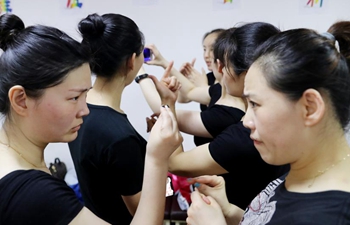MADRID, May 26 (Xinhua) -- The Spanish Socialist Workers Party (PSOE) on Sunday won the European elections, with Minister of Foreign Affairs, the European Union and Cooperation Josep Borrell appearing to analyze the results.
"We have the conditions to have a more democratic and closer Europe," Borrell said at the PSOE headquarters in Madrid.
The minister, the PSOE's European candidate, congratulated himself after having obtained 20 of the 54 MEPs that Spain sends to the European Parliament.
"The Socialists have contributed a lot to the construction of Europe," he said.
Borrell stressed that during his mandate in the European Parliament he will try to make it more social, digital and ecological.
"These three things at the same time will continue to make Europe the place of the world where political freedom, social solidarity and economic progress have been achieved better than elsewhere," he said.
Spanish Prime Minister Pedro Sanchez accompanied Borrell during his speech and thanked citizens for their confidence one month after the general elections on April 28, when he was the candidate with the most votes.
"We are going to be the first social democratic delegation in the European Parliament, it is a pride and an opportunity, but also a responsibility, we will be a progressive alternative to policies of cuts, precariousness and lack of opportunities," he said.
The PSOE was the most voted party in all Spanish Autonomous Communities, except in the Basque and Catalan regions (north), where the regionalist party Basque Nationalist Party won in the former and the separatist "Together for Catalonia" won in the latter.
The second formation with more support was the People's Party (PP), which obtained 12 MEPs, four fewer than in the previous European elections in 2014.
The third most voted party were the Liberals of Citizens (Ciudadanos) with seven MEPs, whose candidate, Luis Garicano, also reviewed the results of his party.
"We really want to work with our European partners, with all the liberals, we are going to be the third group, we are going to be necessary to rule, and we go to Europe to change things, make reforms and work hard," he said.
Leftist party "Podemos" will send six MEPs to the European Parliament. Its leader, Maria Eugenia Rodriguez Palop, explained that they had expected "better results."
The extreme right-wing party VOX won three seats, reducing its force when compared to last month's general elections as it obtained 24 representatives.
VOX had 2,677,173 votes on April 28, while having 1,306,767 ballots and 6.21 percent of the votes in Spain on Sunday. Never having clarified its position on the European Union, it lost half of its support in a month.
The European elections have not been the only poll that Spain held on Sunday, as regional and local elections were also held.
With more than 98 percent of the votes counted, the PSOE has 29.27 percent of the vote, seven points more than the PP (22.24 percent), and has the possibility of ruling in seven of the 12 regions that held elections.
However, the Socialists failed to win the Government of the Community of Madrid, where the PP and its candidate Isabel Diaz Ayuso won.
The Spanish capital will also be ruled by the PP and its next mayor will be Jose Luis Martinez-Almeida. Manuela Carmena, who led a coalition of lefts that tried to give the city a progressive air, was voted out of office.
The political scenario in Spain's second most important city, Barcelona, is also uncertain, because both the Left Republican Party Esquerra Republicana (ERC) and the leftist Barcelona En Comu obtained ten councilors and must agree with other parties to rule the city.
Other cities such as Valencia (east) will continue to be ruled by the Socialists and a leftist local formation, Sevilla (south) will be ruled by PSOE, and Bilbao (north) will be under the regionalist government of the Basque Nationalist Party.













